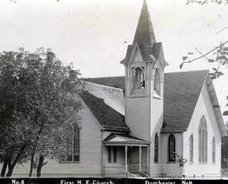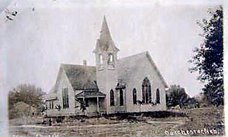 Times reader "Mike" has informed us of a paved road project much closer to home.
Times reader "Mike" has informed us of a paved road project much closer to home. Today, the Nebraska Dept. of Economic Development (DED) issued a release commending the City of Crete for its use of federal Community Development Block Grants. The press release states: "(S)ome areas of Crete were in desperate need of updating. Gravel roads, prevalent in certain areas, had the accompanying problem of little or no drainage systems to alleviate standing water and erosion. The unpaved roads were steadily becoming a dilemma; the gravel roads could not be plowed after snowfall, creating a dangerous obstacle for residents in the area who rely on them for daily travel. Knowing that such a large street improvements project would cost a bundle, the city of Crete looked to the Nebraska Department of Economic Development for funding. The city applied for and received $267,500 in Community Development Block Grant funds, which they matched with $257,500 in local funds giving them $525,000 to begin the endeavor.
"... Since the successful completion of this public works project, standing water is no longer a concern for residents in the area. Water mains have improved water quality and pressure. Snow removal, potholes and mud are no longer problems for the area, and driving conditions are generally much safer. Street maintenance is also much easier. Not only is the area much safer and easier to access, but it is also much more appealing."
Also, we note that Gothenburg this month received $250,000 for engineering, paving, storm sewer, curb and gutter work. The city will provide $259,351 to complete the project.
For information on Community Development Block Grants, contact Elizabeth Martin at 800-426-6505, 402-471-4168, email: ncip2.intern@ded.ne.gov, or visit the Web site: www.neded.org.  We also want to further explain the Times' position on paving, especially since we have received some comments from residents who disagree with our support for paved streets.
We also want to further explain the Times' position on paving, especially since we have received some comments from residents who disagree with our support for paved streets.
Yesterday, we stated why paved streets would greatly improve Dorchester's quality of life. However, we also believe paving makes more sense economically -- in addition to the increased property values that would come with improved streets.
Engineers preparing street development cost estimates look at two major project cost components: 1.) Capital outlay (up-front construction and materials costs) and 2.) Operations and Maintenance (long-term costs associated with keeping the system operational).
With a paved street system, capital outlay is large and maintenance costs are relatively low. With a dirt/gravel road system, capital outlay is less, but maintenance costs are significantly higher. Last year, the Village of Dorchester budgeted more than $70,000 for maintenance of streets, according to our sources. Of course, this does not include the cost of labor for village employees who must do the work.
Since the days of the "great paving debate of 1979," many, many Dorchester dollars have been spent on upkeep of gravel roads -- money that could have been used for permanent paving projects over the past 30 years. In the end, a paved, curbed road system is more economical, safer, more attractive and may even improve Dorchester's water quality due to cleaner runoff.
 Soon, the cry of "Play ball!" will echo throughout the village.
Soon, the cry of "Play ball!" will echo throughout the village.





































































